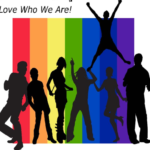“Marginalized populations start off at a stage of questioning and paranoia. Then there’s this long journey where you go along until you eventually are comfortable with yourself and you can function as a “normal” person. And I think if we can speed up that process (in Grenada) as much as possible so that people can start living their lives and be comfortable sooner than later, then that would have a big impact on peoples’ lives. Ultimately, we want people to have a better life.”
Quoted from Nigel Mathlin, leader of LGBT GreCHAP
About the Island of Spice–Grenada
Grenada is an island country and British Commonwealth member consisting of the island of Grenada and six smaller islands at the southern end of the Grenadines in the southeastern Caribbean Sea.
Grenada is also known as the “Island of Spice” because it is a leading producer of several different spices. Cinnamon, cloves, ginger, mace, allspice, orange/citrus peels and especially nutmeg, providing 20% of the world supply, the world’s second largest producer after Indonesia.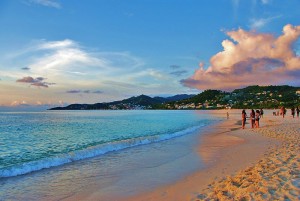
Tourism is Grenada’s main economic product. Conventional beach and water-sports tourism is largely focused in the southwest region around St George, the airport and the coastal strip where there are many idyllic beaches including the 3 km (1.9 mi) long Grand Anse Beach in St George which is considered to be one of the finest beaches in the world. (photo)
Its size is 344 sq km (133 sq mi) with an estimated population of 110,000. Its capital is St. George. There is passenger ferry service between Grenada and Barbados, St. Vincent, St. Lucia, and Trinidad.
Grenada is the largest island in the Grenadines which includes eight smaller islands: Carriacou, Petit Martinique, Ronde Island, Caille Island, Diamond Island, Large Island, Saline Island, and Frigate Island. On the north end of the Grenadines is the island nation of St Vincent. Most of the population lives on Grenada where English is the official language and Grenadian Creole is the ‘workers language’.
As for religion, the Roman Catholic population claims about 53% of attendees with Protestant sects claiming about 47%. In sports, Kirani James won the first Olympic gold medal for Grenada in the men’s 400 m dash in the 2012 Summer Olympics.
In 2004 and 2005 the island was hit with two very destructive hurricanes which resulted in much improved building and safety codes.
A majority of the citizens are descendants of the African slaves brought by the English and French; few of the indigenous Carib and Arawak population survived the French purge of the 17-18th centuries. A small percentage of descendants of indentured workers from India were brought to Grenada in the 19th century. Grenadians of Indian descent comprise the second largest ethnic group, after Afro-Grenadians. There is also a small community of French and English descendants. The rest of the population is of mixed descent. (Wikipedia)
It was a French colony from 1649-1763 and then a British colony from 1763 until its independence in 1974–after which it went into a period of civil war over political power.
By 1983 the political situation was still unstable with socialist politicians jockeying for power. In October 19, 1983 the prime minister was overthrown and later assassinated which threatened the island with pro-communist worries for the US. On October 25, 1983 the US invaded Grenada which was criticized by many nations in the UN as “a flagrant violation of international law”. The US took down the top political leadership of Grenada as well as the entire military chain of command directly responsible for the assassination. The US withdrew its troops in December 1983 and free elections were held in December 1984 which began a period of stabilization that still exist today. (Wikipedia)
Gay Life–Under a Cloud
It’s well known that a large number of young people leave the island to seek wider economic and educational opportunities elsewhere. Estimates are that at least the same number of current residents in Grenada (110,000) also live in other parts of the Caribbean and a similar number are in First World countries, which make remittances a serious source of income for many island families.
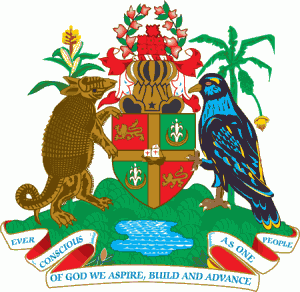 It is hardly acknowledged that a certain number of these people emigrate to escape the homophobic atmosphere that exists in the Grenadian culture. In a country that criminalizes homosexuality and is highly Christianized and therefore homophobic, few LGBT people want to stay if they can find an opportunity live in more liberal places such as Europe, Canada, US and Australia. There is no LGBT center or dedicated LGBT organization in Grenada. (photo left: coat of arms)
It is hardly acknowledged that a certain number of these people emigrate to escape the homophobic atmosphere that exists in the Grenadian culture. In a country that criminalizes homosexuality and is highly Christianized and therefore homophobic, few LGBT people want to stay if they can find an opportunity live in more liberal places such as Europe, Canada, US and Australia. There is no LGBT center or dedicated LGBT organization in Grenada. (photo left: coat of arms)
Even though the anti-gay laws are only slightly enforced they still hang over life like a shadow that can grab a person at anytime, such as the recent May 2011 arrest of two consenting adult men for being caught while engaged in sex.
The men, aged 41 and 17, might be sentenced to ten years in prison – the maximum punishment for same-sex acts, despite the fact that the sex was consensual and the age of consent is 16. The antiquated colonial anti-buggery law forbids ‘unnatural connections’. The outcome of their arrest is not known. In an odd twist of justice, lesbian sex is not illegal in Grenada.
Much like Jamaica, St Lucia and several other gay-criminalizing Caribbean islands, Grenada has been successful at ‘nation-branding’ to minimize negative publicity about human rights abuses and to emphasize their clean beaches, scuba-diving, balmy weather and resort lounging. Today the island is a most popular Caribbean destination.
One brave gay Grenadian (not residing there) has posted this video on YouTube: Being gay in Grenada.
LGBT Activism
Of course, LGBT people in Grenada are ignored in any publicity about Grenada, but that doesn’t mean our community is asleep or dormant. The most active LGBT/HIV human rights organization is called GreCHAP.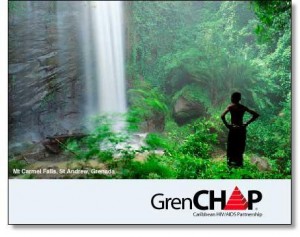
GrenCHAP is the Grenada chapter of the Caribbean HIV/AIDS Partnership (CHAP) — a network of NGOs and CBOs in the easter Caribbean working to promote Human Rights and Health, with a focus on marginalized populations such as LGBTI and Sex Workers.
Our objectives are:
1. Promote the health of key populations through education for prevention and skills building
2. Build and assist support networks of key populations
3. Engage in public education to sensitize and humanize issues facing key populations
4. Advocate for policy & legal reform to promote equality and universal access to health
5. Facilitate advocacy on human rights violations
Founded in 2006 by its current director Nigel Mathlin, GrenCHAP has been active in LGBT and HIV education, organization, advocacy, advising, program development, participating in a documentary film, and more. In 2011 they achieved the opening of a safe space to provide resources and counseling to the public, including young and vulnerable LGBT citizens. A safe space is one of the most valuable offerings for any stigmatized minority whose members often have no other place to turn for support. “More of our work is around human rights and advocacy work as opposed to strictly HIV,” said Nigel in 2009.
GrenCHAP has an active community life on Facebook that is playful, thoughtful and entertaining: . The also have a Yahoo Group but it has been surpassed by the more interactive Facebook page.
Two Interviews with Nigel Mathlin
In an interview with Medwiser.org about GrenCHAP, Mathlin said:
“It’s a continuing journey, it’s very challenging, getting the courage to be a public face—standing up, bringing out important issues that are not really very popular. People automatically assume that you may be HIV-positive or that you are an MSM, a sex worker, a drug user, or any of the other populations that you advocate for. But the whole point of it is to make all of those things irrelevant. Whether I’m straight or gay it should not affect my access to treatment or my rights.”
“Stigma against men who have sex with men is a huge obstacle to HIV programming in the eastern Caribbean. Until recently, male–male sex was not even recognized. “It was challenging, nobody really wanted to talk about the issue”, explains Mathlin (photo left). “People said ‘We do not have any gay people in Grenada.’ I mean,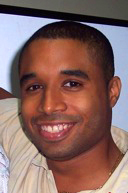 at present there there is still criminalization of men who have sex with men in many of the Caribbean Islands.” Mathlin tries to take every opportunity to educate people and to give a voice to men who have sex with men. But there is a long way to go. “It is clear that so much work needs and remains to be done.”
at present there there is still criminalization of men who have sex with men in many of the Caribbean Islands.” Mathlin tries to take every opportunity to educate people and to give a voice to men who have sex with men. But there is a long way to go. “It is clear that so much work needs and remains to be done.”
As for his own personal safety, “he fears that homophobia may force him to leave his beloved home and country, as happened to some of his Jamaican peers. But work must go on. “I can make a difference”, says Mathlin. “No matter of how small the impact is, it is a positive one, and at the end of the day if I can save one or a few lives, or if I can make life easier for people who do not have a voice, I’ve done my part, that is enough for me.”
In another interview with a former Peace Corps volunteer in 2009, Nigel expressed his frustration about the ‘American gay marriage issue’. “People here don’t really understand. As soon as they hear anything gay-related in the Caribbean now they immediately think we’re talking about marriage, and that is not what the issue is. Sometimes the conversation is shut down even before we get a chance to say this is not the issue in the Caribbean. We’re talking about basic human rights, removing repressive laws from books. That has been a challenge for the work that is going on in the Caribbean, and it’s a huge challenge to keep the conversation on track.”
When asked why he refers to MSM instead of gay men, he said, “I still use the term MSM (men who have sex with men) is because there are a lot of people here who are so closeted–men who have sex with men and do not consider themselves gay. We don’t have any gay bars or gay hang out places. There’s hardly a community. It’s more a matter of guys who have their girlfriends or have their wives and who also sleep with men on the side… anybody finding out that they’re gay is the worst thing possible…”
This kind of hidden behavior, he further explained, is what prevents any kind ‘community’ or partnerships from forming: “Because of that fearful secret, it’s very rare that people develop relationships with persons of the same sex. People might have steady “friends with benefits” kind of thing but it’s never really a relationship. It’s never regarded as an emotional relationship…. there have been a few couples around, but don’t expect that to show up on a national census anytime soon.”
As for well-meaning foreign countries boycotting homophobic islands like Jamaica or St Lucia or Grenada, Nigel warned this is not as simple as it appears: “Calling for a boycott of a country that depends on tourism is going to make life worse for everybody, especially the persons who already have life difficult, i.e., the persons (tourist industry workers) who are the most at risk. Yes, it’s all well and good to want to help, but you have to have some sort of respect, some sort of regard for the advocacy work that may be happening in these countries that you want to target. For outside advocates or agencies interested in doing work in regions around the world, dialogue with existing agencies in those parts of the world is critical…”
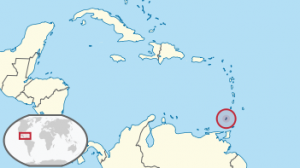 As for regional LGBT advocacy, “We’re one Caribbean. We all have very different local nuances, but at the same time, a lot of the same basic issues that we are dealing with right now are common across the Caribbean. The legal issue, for instance, that was inherited when we were all under British rule. Most of us are now independent states. We’re no longer under British rule, but the laws are still here. And it’s best if we advocate for change as a region…
As for regional LGBT advocacy, “We’re one Caribbean. We all have very different local nuances, but at the same time, a lot of the same basic issues that we are dealing with right now are common across the Caribbean. The legal issue, for instance, that was inherited when we were all under British rule. Most of us are now independent states. We’re no longer under British rule, but the laws are still here. And it’s best if we advocate for change as a region…
“Marginalized populations start off at a stage of questioning and paranoia. Then there’s this long journey where you go along until you eventually are comfortable with yourself and you can function as a “normal” person. And I think if we can speed up that process as much as possible so that people can start living their lives and be comfortable sooner than later, then that would have a big impact on peoples’ lives. Ultimately, we want people to have a better life.”
Sexual Repression in Grenada
Many organizations and individual have called for the repeal of Granada’s antiquarian and backward sexuality laws which criminalize same sexual activity. Outspoken leaders, including the UN Secretary General, have condemned such repressive laws and urged a more modern view of private and consentual sexual behavior.
A Shadow Report entitled ‘Sexuality, Gender, HIV Vulnerability & Human Rights in Grenada’ was written in 2007 for the United Nations Human Rights Committee by seven leading Grenadian and Caribbean health and rights organization. In that report the advocates of reform described:
“The effect of having legal penalties for sodomy and for vaguely defined “unnatural” acts is that even when they are not enforced, these laws strengthen social stigma against homosexuals. That stigma, in turn, can be even more effective than legal penalties in stripping individuals of the rights guaranteed to them under the ICCPR.8 When a homosexual person cannot find employment, secure adequate housing, or get proper medical treatment because of social stigma,
“These difficulties amount to 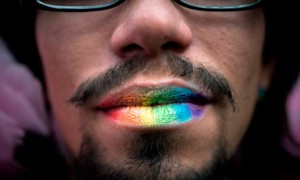 deprivations of life, liberty, health and opportunity on the basis of sexual orientation. Grenada’s law criminalizing sodomy reinforces the animus that enables these violations to occur. Repealing these provisions would be an affirmative and much-needed step, in ending discrimination on the basis of sexual orientation and gender identity in Grenada.
deprivations of life, liberty, health and opportunity on the basis of sexual orientation. Grenada’s law criminalizing sodomy reinforces the animus that enables these violations to occur. Repealing these provisions would be an affirmative and much-needed step, in ending discrimination on the basis of sexual orientation and gender identity in Grenada.
“Statutes criminalizing homosexual activity tend to impede public health programs by driving underground many of the people at the risk of infection.” In fact, failure to address anti-gay discrimination contributes not only to the HIV vulnerability of same-sex practicing people, but to their heterosexual partners as well.”
Unfortunately, since that report was published the fearful weak-willed parliament in Grenada has failed to take any action in the direction of reform, leaving the island-nation as one of nine in the Caribbean that still criminalize private adult consensual behavior. (There are 15 countries that have reformed their laws.)
Finally
Grenada has a long way to go to achieve LGBT respect and equality. Overcoming political discrimination and religious bigotry are two of the major challenges for gay activism in the 21st century, within Grenada and far beyond. As Ted Kennedy said years ago when his brother died: “the work goes on, the cause endures, the hope still lives, and the dream shall never die.”
Story by Richard Ammon
GlobalGayz.com
September 2012
More Reading about Grenada:
Google Photo Gallery of Grenada
UNHCR report about Grenada and sexuality:
–http://www.unhcr.org/refworld/docid/4b20f03dc.html
-http://www.irb-cisr.gc.ca:8080/RIR_RDI/RIR_RDI.aspx?id=452548&l=e
Situation and treatment of homosexuals; state protection and support services (2006-2009)
Sexual Minorities & HIV Status
–http://www.asylumlaw.org/legal_tools/index.cfm?category=531&countryID=233
Organization for women
–http://www.grenwad.com/
Arrests and Denials
–http://madikazemi.blogspot.com/2011/05/in-grenada-arrests-for-homosexuality.html
Another protest against a gay cruise to Grenada (2012)
–http://www.barnaclegrenada.com/index.php/local-news/2283-another-gay-cruise-to-grenada
List of HIV and LGBT professionals in Caribbean
–http://www.iliveup.com/resources/mediaprofessionals/keyfigures.php
Blocko Projecct
–http://youthvisioning.org/fr/projets/vihsida/caraibes/95-grenada-the-blocko-project.html To empower young people to change risky behavioral patterns; that we all have human rights and can respect each other’s rights.
==========================================================
Anyone interested in the condition and circumstance of LGBT people in the Caribbean should read the report issued by the International Lesbian and Gay Association in 2011. It is a complete report that lists the gay-friendly as well as homophobic states in the Caribbean.
In the following nine countries homosexuality is criminalized:
Antigua and Barbuda,
Barbados,
Dominica,
Grenada,
Jamaica,
Saint Kitts and Nevis,
Saint Lucia,
Saint Vincent and the Grenadines,
Trinidad and Tobago.
Curiously the USA maintains formal diplomatic relationships with all seven Caribbean countries that criminalize homosexuality. This is either a paradox or a blessing: The Embassy maintains foreign relations with these seven governments: Antigua and Barbuda, Barbados, Dominica, Grenada, St. Kitts and Nevis, Saint Lucia, St. Vincent and the Grenadines. The US says it seeks those governments’ support in multilateral forums to promote democracy and economic stability in those islands and to facilitate the entry of legitimate visitors, and finally, to assist U.S. citizens and businesses overseas.
More recently, under the Obama administration these embassies are also committed to promote human rights for all. Whether these small countries are listening is obvious; none have changed their laws to legalize same-sex orientation.
Fortunately in the Caribbean there are more countries in which same-sex activity is legal (but not free of homophobia).
These are:
Aruba,
Bahamas,
British Virgin Islands,
Cayman Islands,
Cuba,
Curacao,
Dominican Republic,
Montserrat,
Netherlands Antilles (Bonaire, Saba, Sint Eustatius)
French West Indies (Guadeloupe, St Barts, Martinique, St Martin); (legal since 1791),
Haiti,
Puerto Rico,
Sint Maarten,
Turks and Caicos Islands,
US Virgins Islands (St. Croix, St. John, St. Thomas, Water Island).
Also, see this LGBT report on eleven Caribbean destinations that includes some gay owned and gay-friendly venues.



